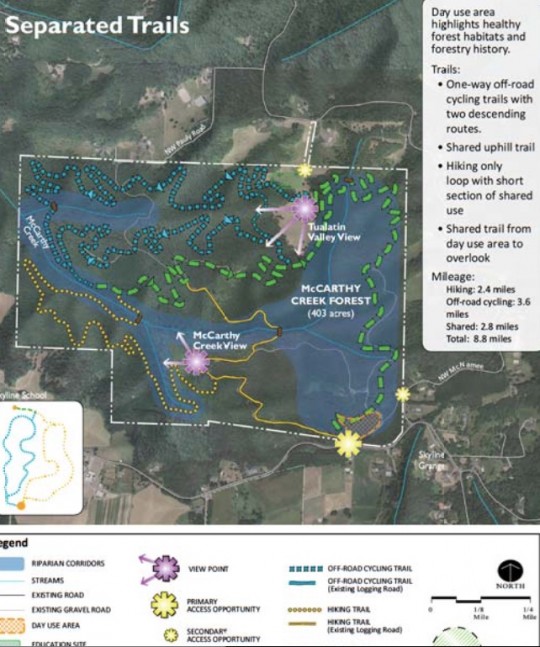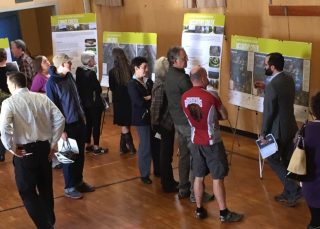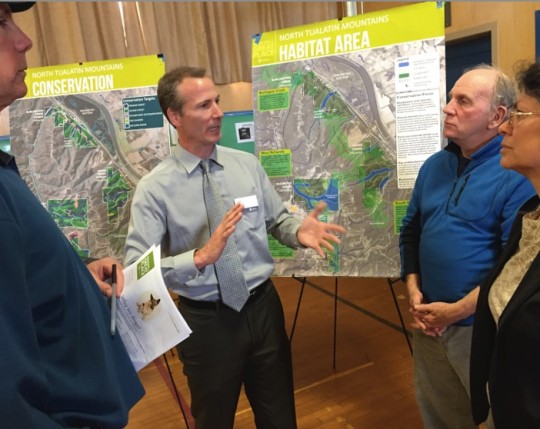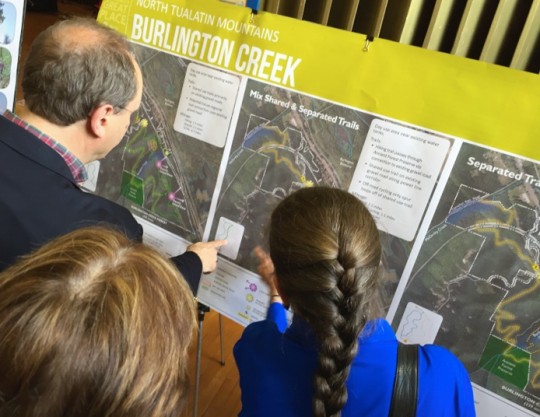In an unprecedented move, Metro has proposed singletrack trails in a natural area that would be built specifically for bicycling. Calling them “bike-optimized” trails, Metro unveiled the concept at an open house for the North Tualatin Mountains project at Skyline School last night.
Using money from voter-approved bond measures, Metro is now ready to develop 1,300 acres spread across four separate parcels just north of Forest Park between Skyline Road and Highway 30. From the outset, Metro hinted that singletrack trail riding would be considered as they designed the trail plans for the parcels. Last night they made it official.
“We’re going to take an approach based on science and shaped by public feedback to offer them meaningful ways of interacting with nature. We feel we can protect habitat and allow for public access.”
— Dan Moeller, Metro
In addition to the biking trails that made news last night, Metro also announced that they will conduct a region-wide inventory of dirt and singletrack cycling opportunities.
At an open house last night Metro shared two or three concept plans for each of the four different parcels: Burlington Creek Forest, 339 acres; Ennis Creek Forest, 350 acres; McCarthy Creek Forest, 403 acres; and North Abbey Creek Forest, 211 acres. In three out of the four parcels there was some combination of trails that would either be shared or separated hiking/biking trails.
If Metro were to build all the trails they showed last night, there would be 9.2 miles of biking-specific singletrack across three different parcels (Metro is not proposing any bike trails at the North Abbey Creek site).

– Download all the trail maps shown at the open house –
Metro’s plans come in stark contrast to the City of Portland’s current stance on mountain biking. The City’s Parks & Recreation and Environmental Services bureaus have prevented the development of new bicycle trails, or improved access on existing ones, in properties like Forest Park and River View Natural Area.
Perhaps hoping to clarify their different approach to cycling, prior to the open house Metro invited the media to a special briefing on the topic. At the briefing (I was the sole media person in attendance) Metro Natural Area Programs Interim Director Dan Moeller explained that his agency “has heard loud and clear” about the demand for off-road cycling.
“In developing our sites, our first priority is to protect wildlife and water quality,” Moeller continued. “We’re going to take an approach based on science and shaped by public feedback to offer them meaningful ways of interacting with nature. We feel we can protect habitat and allow for public access.”
Advertisement
Moeller spoke of the “rich conversation with new partners” Metro has engaged in around the Tualatins Mountains project and their planning process for Newell Creek Canyon in Oregon City. However, that conversation has also revealed that not everyone around the table is speaking the same language. To remedy that, Moeller announced that Metro will conduct a regionwide inventory dirt and singletrack trail riding opportunities. Moeller said they’ll create a “glossary” of facilities to shore up persistent public confusion around, for instance, the difference between a fire road and a singletrack trail.
The inventory would also include driving distances to various types of off-road riding experiences to help Metro assess where gaps and opportunities exist and inform how they develop natural areas.
Mindful of the City of Portland’s Off-Road Cycling Plan effort, Moeller was careful to point out that Metro’s work will be “just an inventory – not a plan or a process.”
“We want to create a common language,” he added, “And to say, ‘This is where it is, and these are the experiences you can have there.'”
As the open house got started there were several dozen attendees. It was a mixed crowd of residents, people wearing bicycling apparel, and Metro staff. There were also two Metro Councilors in attendance: Sam Chase and Kathryn Harrington.
Metro planner Robert Spurlock gave a brief presentation and underscored an important point: Metro is not going to build all the trails represented in all the concept plans. He said what they do end up building will be the product of environmental analysis, budgetary constraints (they have about $500-750,000 for trail development), and public feedback.
Ecological preservation will be paramount, but it won’t be the sole factor Metro considers. Metro Natural Resource Scientist Kate Holleran said she already knows there will be conservation trade-offs with any type of access into the land. “But for us, equally important to conservation of the land is getting people on the site. We want to be as honest and transparent about what those impacts will be and then let the public and our leaders decide what to do.”
“We need places for singletrack. It’s a great and growing sport.”
— Marcy Houle, author and wildlife biologist
Last night I learned that at least two Metro staff members have gone through a sustainable trail-building course put on the International Mountain Bicycling Association. Holleran seems to understand the importance of not just allowing cycling but designing the trails specifically for them. “There is a lot we can do with trail design,” she shared with me, “That can minimize impact on water quality and wildlife.”
No matter what happens next, Portlander Ryan Francesconi, who rode his bike to the open house, is thrilled by the prospect of new trails. “It’s exciting that they’re even considering it,” he said.
And even Marcy Houle, the woman who fought tooth and nail to prevent the City of Portland from improving bicycle access in Forest Park, sounds supportive. At last night’s event she said she thinks these new trails could, “Take the heat off Forest Park.”
“We need places for singletrack,” Houle said,”It’s a great and growing sport. My only concern, as a biologist, is that it doesn’t pinch off this important wildlife corridor.”
Metro expects to have a recommended trail plan by early fall (after another open house this summer) and construction could begin in 2016 with trails opening by 2017.
If you missed the open house, you can submit a comment form online.
CORRECTION: The original version of this story included the wrong data for singletrack mileage. We regret the error.




